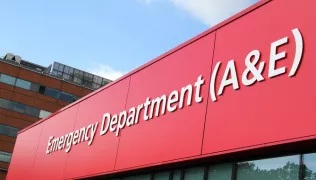Emergency department waiting times reduced thanks to queue trial
Wednesday 17 July 2024

Matron John O'Neill outside the emergency department at St Thomas' Hospital
Patients are now having their condition assessed whilst in the queue to the emergency department (A&E), following an innovative trial which showed this dramatically improves waiting times.
The new way of working has moved one of the senior triage nurses from behind the desk at reception to the front door of the emergency department at St Thomas’ Hospital. The ‘triage flow navigator’ progresses down the queue to give primary assessments.
The key aim was to ensure a meaningful assessment within 15 minutes of arrival, in line with NHS England guidelines.
The triage flow navigator speaks to the patient about their condition and uses their clinical judgement to fill in a simple form, which includes an acuity score out of 5. Patients with a score of 1 or 2 are immediately escalated to resus. Other patients may be pulled out of the queue to be redirected to the urgent care centre or eye emergency clinic, and under 18s are taken to the children’s emergency department.
The new role also redirects people who are in the wrong place. This helps quickly shrink the size of the queue, with data from the trial showing around 10 to 12 per cent of those in the line are actually looking for another department.
Emergency department matron, John O’Neill, was inspired by a similar model in place at Medway Hospital where he worked for three years before moving to Guy’s and St Thomas’ in early 2023. He said:
The 15-minute target is there for a reason – it’s about safety. It’s all about making sure that the patient gets seen as quickly as possible and is directed to the right place.
“Sometimes demand for our emergency department can be very high, and the queue can be half way down the road. Before this role was introduced, the condition of these patients was unknown until they reached the front of the line. This role takes the anxiety away, and we are already seeing the benefits.”
The triage flow navigator role was trialled for two weeks in November 2023 and was extended until the end of the year. The improved outcomes led the senior leadership team to agree to fund the role from 8am to 8.30pm, seven days a week.
John added: “There are lots of benefits to the patient, including being able to have a senior decision on their pathway right from the start. We have also found that we are maximising our GP appointment allocation and reducing aggression at triage as patients appreciate being assessed more quickly.
“This ultimately helps reduce pressure on our ED, with those needing to be there being seen faster, and those that are better supported elsewhere getting this information in the fastest manner possible.”
Last updated: July 2024
Contact us
If you're a journalist and have a media enquiry, please contact us.
Phone: 020 7188 5577
Email: [email protected]



